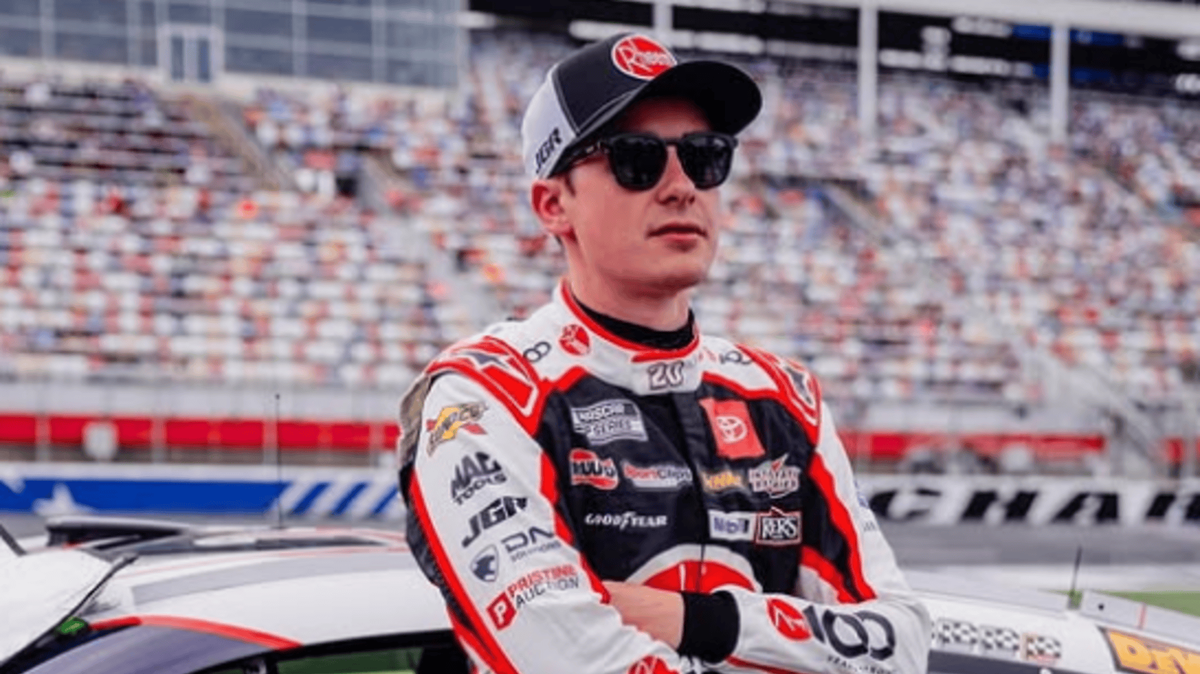

Moments after the final yellow faded at Dover, the expression on Christopher Bell’s face told a story few outside the garage could decipher. Here was a racer who had tasted the front, led 67 laps, dispatched the pressure of seasoned rivals, and even managed to catch just the right caution at the right time. Yet, amidst all that speed and resilience, his day ended mired in frustration, P18 on the leaderboard, his car quiet in the aftermath of what felt like another self-inflicted wound. Observers in the pits and on social media quickly noted how Bell’s one-man thrill ride through the treacherous Monster Mile had become almost routine.
Watch What’s Trending Now!
Not from a lack of aggression or pace, but perhaps from a margin of belief and confidence so razor-thin, it left him vulnerable to the edge that defines racing at NASCAR’s highest level. What then really happened to Bell? What invisible thread ties moments of brilliance to acts of undoing?
Spinning on the Knife-Edge: Bell’s own words and the reality of talent
Christopher Bell’s performance at Dover perfectly encapsulates the ongoing narrative of his 2025 season: exceptional speed undermined by self-inflicted setbacks. Leading 67 laps and capturing Stage 2 on the demanding Monster Mile showcased Bell’s undeniable pace and skill. Yet, as the race reached its climax, Bell’s two spins, first battling Chase Elliott for position and later racing teammate Denny Hamlin, cost him any chance of a top finish. Reflecting on the spins, Bell admitted, “I don’t know. I definitely wasn’t gonna lift, and I know he wasn’t gonna lift either… Just spun out. So, Dover and spinning out. I’ve got a problem with that”.
His acknowledgment of pushing “too hard” underscores a key tension between his aggressive driving mentality and the fine margins required for success. Freddie Kraft, a veteran NASCAR analyst, offered pointed insight on the Door Bumper Clear podcast into Bell’s dilemma: “He’s one of the most talented guys in the sport… but boy, he spins himself out a lot… I hate when people say they’ve run out of talent… they trust their talent too much… they’re on the edge so much that they just step over that one little bit”.
This assessment contextualizes Bell’s struggles not as a failure of skill, but as an ongoing challenge of balancing raw talent with controlled execution at critical moments. Dover’s conditions—where grip fluctuates and restarts intensify pressure — only amplify the risk-reward dynamic Bell navigates every lap. Despite the late-race setbacks, Bell’s team capitalized on a fortunate rain caution by staying out during pit stops, briefly cycling him back to the lead and reinforcing the speed and strategic savvy present in the No. 20 camp.
Bell himself remains focused on the positives: “The guys did a really good job… I’m proud of the effort… I got a playoff point, and hopefully we can keep bringing that speed.” This balance of recognition and frustration is emblematic of Bell’s season in microcosm, capable of dominating on his day, yet often undone by pushing his car and himself beyond justifiable limits.
Dover demonstrated the razor-thin divide Bell must master: the talent to lead races and win stages, and the discipline to keep those drives clean. His spins are not random mistakes but symptoms of a driver intensely aware of his abilities, sometimes too much so, stepping beyond boundaries that separate greatness from lost opportunities.
The wider pattern: promise without payoff
Bell’s 2025 has become a storyline of peaks and frustrating valleys. Early in the season, he was unstoppable — three straight wins, an early championship favorite, and the kind of raw pace that had analysts comparing his stretch to Kevin Harvick’s legendary 2018 run. But since March, the victories have evaporated. The numbers paint it plainly: At Dover, Bell led 67 laps, won Stage 2, and had the fastest car by intervals, yet finished 18th after two solo spins.
Teammate Denny Hamlin, now with four wins in 2025, was the immediate rival Christopher Bell battled in those crucial late laps before Bell’s self-induced error. In previous races, Bell’s stellar qualifying yielded squandered opportunities, often by misjudging the car’s limits or running the edge one fraction too far. The swings in stage points and playoff implications loom large; missing out by a handful in one race, gaining a margin the next, but consistently finding ways to exit contention through moments of overreach.
Importantly, psychological edge is at play. After Dover, Bell’s focus was as much on the positive as the team’s renewed pace, the effort, and the sense. Yet, patterns matter. NASCAR’s highest echelon rewards risk, but not recklessness. Pushing “on the edge” is the only way to win, but living there, as Bell’s spins show, can turn the fastest car on the day into one more “bummer” result.
As the season continues and playoff pressure mounts, the challenge for Bell may not be finding speed that’s proven. Instead, it’s mastering the razor-thin divide between brilliance and downfall without being his undoing. As Dover proved, talent isn’t enough if boldness defines as much the outcome as by the errors that follow. For Christopher Bell, the climb back starts not in the speed charts, but in mastering exactly when and when not to trust the edge.








